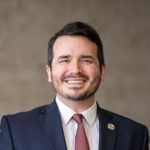About The Hispanic Faculty Experience
An interview with Octavio Esqueda and Benjamin Espinoza
Adapted from interviews by the Christian Scholar’s Review and Leafwood Publishers
What led you to edit this book? What problem or issue(s) are you seeking to address?
OE&BE: We were both inspired by several books that highlight the experiences of racially and ethnically minoritized scholars, but wondered why Latinos weren’t being highlighted. So we knew we had to put together this book; we needed to take the leap forward and elevate our own voices!
In many colleges and universities there has been an interest in attracting more Hispanic students but not enough focus on attracting Hispanic faculty. We wanted to hear Hispanic professors describe their journeys in the academy and the challenges they faced because we believe that representation is important. The goal of the book is to create an avenue for Hispanic faculty to share their experiences and thus provide a framework for institutions to better understand their Hispanic faculty and so plan accordingly on how to support them.
What unique contributions do Hispanic/Latino faculty bring to Christian colleges and universities?
OE&BE: On the one hand, Hispanic faculty contribute to the academy just as all faculty members do, they are experts in their disciplines and strive to teach well. The added contribution is the perspectives they bring which is necessary to serve a diverse student body well. Their cultural insights enhance their ability to relate to Hispanic students. They can empathize and connect on a personal level. As far as how Hispanic faculty contribute to students from the majority White culture, this connects to the diversity of the Body of Christ and how learning is thus enhanced. Students who interact with people who look and think like they do for the majority of their time in college have a limited educational experience. When students are exposed to faculty members from diverse cultures, it broadens their perspectives and enriches their educational experience.
What are some challenges that Hispanic/Latino faculty face?
OE&BE: One challenge is that Hispanic faculty are often pressured to assimilate into the dominant culture. Hispanic faculty often struggle to bring their whole selves to the academy to feel appreciated in their academic life and contribute insights from their cultural backgrounds. I share in my chapter how many of my colleagues saw me as just a “Hispanic professor” as opposed to a scholar in my discipline. I am not a token representative; I am an academic scholar who embraces my Hispanic heritage. Another challenge is that Hispanic faculty, as well as minority faculty in general, often do more than people realize. They are asked to serve on many committees to provide diverse perspectives, students of color often come to them for guidance, counsel and support as they navigate being on a predominately White campus. While these are strengths that Hispanic faculty bring to the institution, these services are rarely acknowledged, are time-consuming, and can take time away from items necessary for promotion, such as research, writing, and publication.
Who’s your target audience?
OE&BE: This book was intended for a couple different audiences. We believe that administrators in Christian higher education will greatly benefit from this book, as it centers the lives and experiences of Latine people and clearly indicates that the conditions in which racially and ethnically minoritized people work need to change. In addition, we want emerging Latine scholars to read this book and be inspired by the stories of those who have navigated Christian higher education before them. We want to inspire a new generation of Latine Christian scholars to continue pursuing careers in Christian higher education because this work is transformative and can play a strong role in God’s redemptive plan for humanity.
About the Editors




Octavio Esqueda (PhD, University of North Texas) is Director of PhD and EdD Programs in Educational Studies at Talbot School of Theology at Biola University.
Benjamin Espinoza (PhD, Michigan State University) is Affiliate Assistant Professor of Youth, Family, and Culture at Fuller Seminary.

